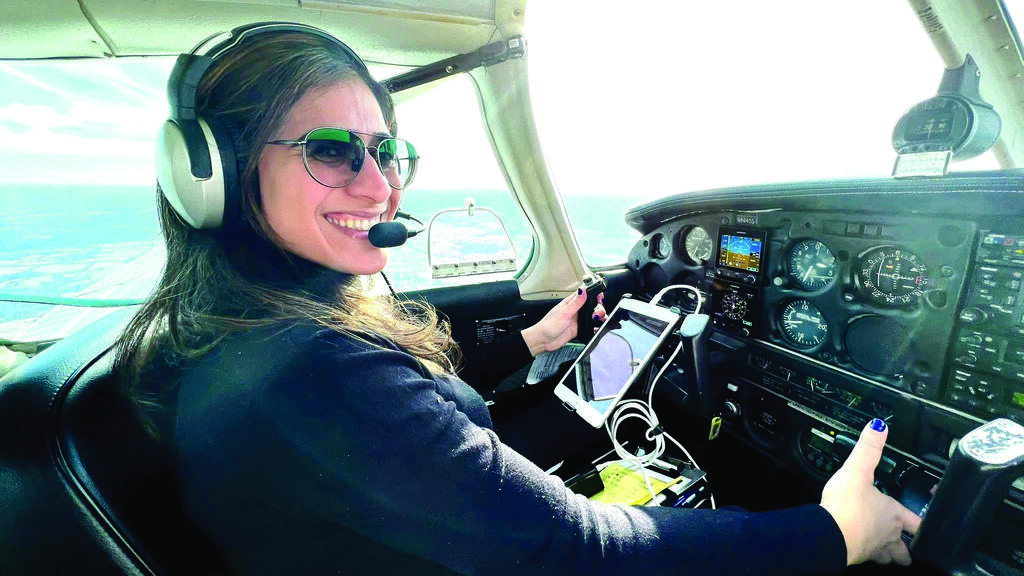Getting your Trinity Audio player ready...
"If today's Naomi were to tell young Naomi that she would become a pilot one day, young Naomi wouldn't have believed it,” said Naomi Schayek, a 33-year-old flight instructor from Ramat Gan. “I grew up in Bnei Brak in a religious family that grew closer to Judaism, one of five children. My father is a Torah scholar and my mother is a bank analyst. Our lives were disconnected from the secular world.”
“As a child, I never went to a mall, and we didn't have a TV at home. On the other hand, because my mother made aliyah from Brazil, we hosted people from abroad and I was exposed to different cultures. Our home was also a feminist one, which is quite rare in the religious community. We were educated on gender equality, and all my siblings shared household chores," according to Schayek.
“Despite this, I never thought about becoming a pilot. Career options for women in the ultra-Orthodox sector during my time were limited – a school or kindergarten teacher, seamstress or an accountant. But my parents encouraged me to study computer engineering and, after high school, I continued studying it at the Wolf seminary in Bnei Brak," she continues.
“I enjoyed my studies but wondered if I wanted to follow the typical path set in the religious community. I felt I wanted to choose my life path myself. So, at 19 I moved to Jerusalem on my own. I stayed in touch with my family and tried to share as little as possible about my secular life with them. They respected me and I did the same, and when I visit Bnei Brak, I dress modestly.
“While living in Jerusalem, I was involved in music – I play the piano, drums and guitar. As soon as I arrived in the city, I connected with ultra-Orthodox musicians. It was a fun time and, step by step, I tried to piece together how to navigate the world I was unfamiliar with.
'I entered the world of aviation'
“When I was 20, after receiving my diploma, I started looking for a job in the high-tech sector, but something inside didn't feel right. It didn't interest me enough. One day, a relative who works in the Israir airline’s IT department called me and told me she came across a job that seemed perfect for me – placing aircrews, which meant being responsible for the pilots' schedules.
“The job was intended for Israeli Air Force veterans and, unfortunately, I didn’t serve in the IDF, but I decided to go for an interview and try. Luckily, I was accepted, and that's how I entered the world of aviation,” she recounted.
“I fell in love with the field immediately; something about the international nature and dynamism drew me in. I continued to advance at Israir and went on to complete an operations officer course. After a few years, I started thinking: 'What career path do I want? How do I want to develop myself?' I began a bachelor's degree in computer science at the Open University, and realized I didn't want to continue after a year there.
“I met a personal coach and shared my frustration with her, and she asked, 'Let’s say you had no limits, what would you choose to do?' Without realizing it, I blurted out, 'a pilot.' We were silent, and I was shocked. Where did that even come from? I didn't think I had a chance; a civilian pilot's license is an expensive venture that can cost up to half a million shekels, and I didn't have the money for it. It also meant entering several years of studies and instability, and at that time, I was in a relationship, and discussing starting a family," she recalls.
“But the next question I asked myself was: when you're 90 and look back on your life, what will you tell yourself? That you didn't live life the way you wanted? I decided to go for it. Everyone around me was shocked by my decision to leave something stable and choose an unclear and difficult path. They thought I was crazy, that it was another whim that would pass. I silenced the background noises and listened to myself.
“I wondered where I’d get the money for it. I convinced my bank’s branch manager bank to invest in me because, eventually, I would be profitable for the bank with a pilot's income, and to give me a loan of 200,000 shekels. At the same time, I withdrew all my savings.
'I decided to move to the United States'
“I started studying at the Herzliya airport. The first time I got on a plane was exciting. I wasn't scared, but during the first flights, I felt nauseous. Gradually, it passed. I had to bridge gaps in knowledge – unlike many people in aviation, I didn't grow up with planes, I didn't engage with simulators at home, and didn't know physics at all, not to mention my parents didn't have a car, and the first engine I saw was a Cessna engine (and then, while getting my pilot's license, I also got a driver's license),” she said.
“But I overcame these challenges and, at 27, after a little over a year of studies, it happened – I got a private pilot's license. It was an amazing feeling, proving to myself and everyone that I really could do this.”
“To turn flying into a career, I needed to continue studying. I realized that studying aviation abroad, with different airspaces and weather phenomena, would make me a more professional pilot, so I decided to move to the United States and study there. Leaving my job, relationship and stability, and moving to a foreign country when my English was very basic – it was scary. I cried a lot, but I knew that I had to take this step if I wanted to reach my goal.
“I arrived in the United States in 2018 and discovered a fascinating world. I was on Cloud 9; all I wanted to do all day was fly. On the other hand, there was difficulty in facing the language barrier,” she shared.
“I found myself sitting down and memorizing English words daily. But I managed to finish my licenses in a short time. During my studies, I realized that what I really wanted to do was become a flight instructor, and after a time, I became an instructor and taught students in English.
“I accumulated around 1,500 flight hours in the United States. I lived in Maryland Initially, and then moved to Pennsylvania. I learned about American culture and instructed hundreds of students.
“I noticed a common denominator in everyone – flying is challenging and sometimes lonely, and many pilots are looking for support. So, I established my business, Blue Jay Aviation, which provides professional and mental support for pilots at all stages of their journey.
“After five years in the United States, I started to get homesick, so I returned to Israel about a year ago. I was required to take theory exams and practical tests to obtain an Israeli flying license. While taking my first exam, I met someone who told me she follows me on Instagram and that she doesn't know any female pilots besides me.
“After my conversation with her, I decided to organize a meeting for female pilots, it was then the first meeting of the Israeli female pilots' community was born at my home in Ramat Gan. I shared a post on Facebook, and 15 Israeli female pilots showed up. There was an electrifying atmosphere, and it was clear that it only needed to grow from there,” Schayek said.
“Since then, the community has grown to about 90 Israeli female pilots, and special connections have been formed. We have professional meetings, Zoom talks, as well as closed WhatsApp and Facebook groups.
“I feel a sense of duty and hope the community will inspire other women who want to fulfill their dreams. Gender diversity in the cockpit makes for a higher quality cockpit. Today, after more than half a year of fighting in Gaza, during which we saw many inspiring women at the forefront, I hope that more women will believe in themselves, and prove that nothing will stop them along the way.”





